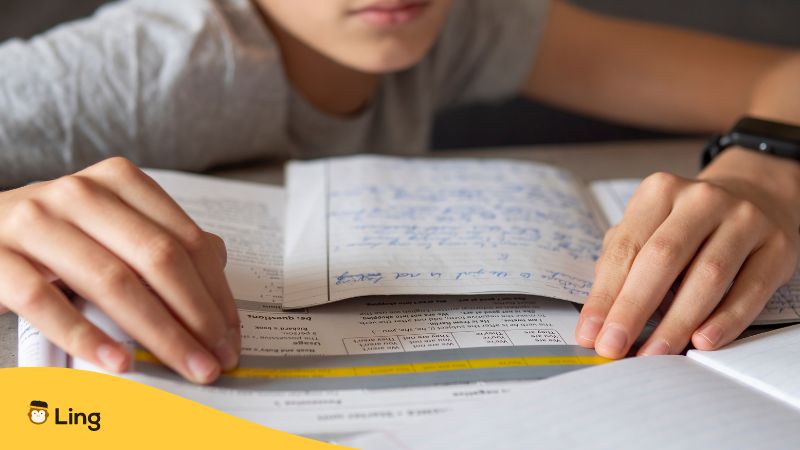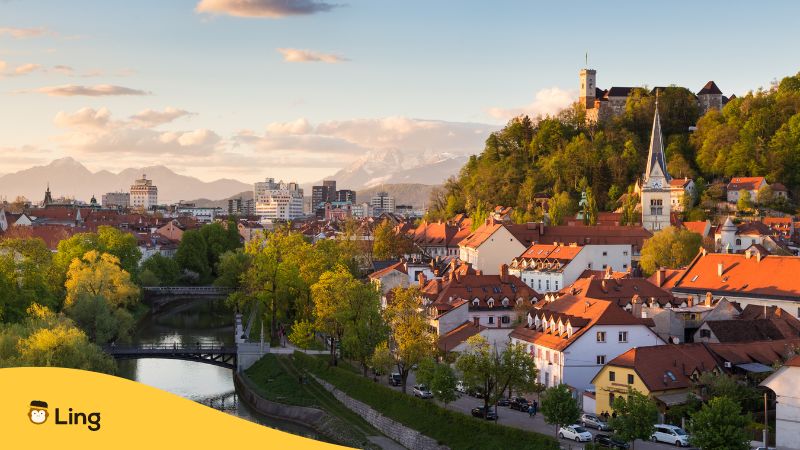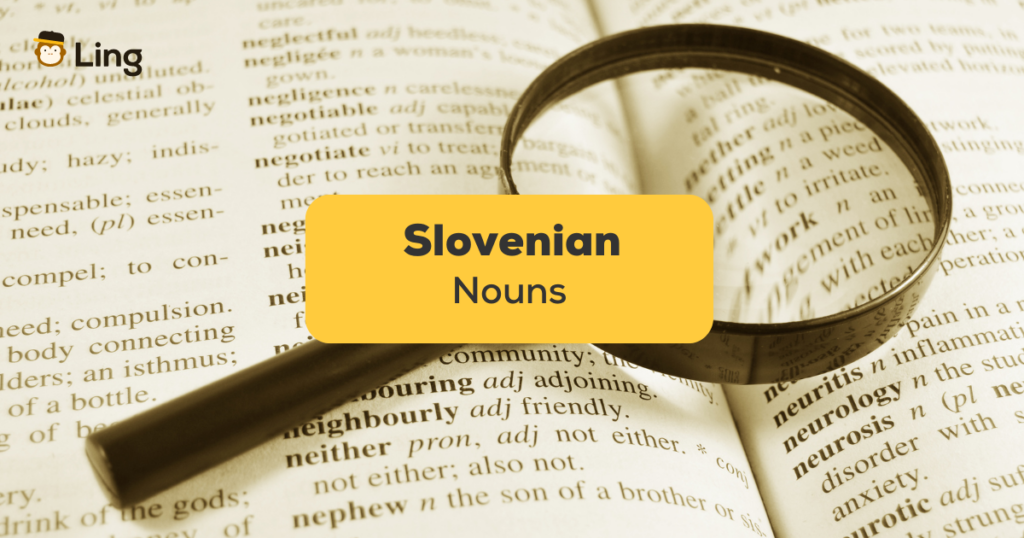Want to become fluent in Slovenian? Whether you’re planning a journey to the country, willing to improve your relationship with Slovenian-speaking colleagues, or just admiring Slavic languages, mastering Slovenian nouns is the key to becoming fluent. In this post, I’ll explain all about them, their rules, and how to use them in everyday conversations.
Nouns are the basic parts of language, essential for forming sentences and expressing meaning. If you’re interested in learning the most common Slovenian nouns and how to use them daily, keep reading as we’ll go through a fun and easy lesson with over 60 Slovenian common nouns.
Slovenian Nouns
In the Slovenian language, much like in any other, nouns play a fundamental role in communicating. Imagine them as the foundation of sentences, giving them the basic structure that they need to make sense.
Slovenian nouns, like nouns in many other Slavic languages, have three grammatical genders and six cases. The gender and the case of a noun determine its form and how it interacts with other words in a sentence.
Additionally, Slovenian nouns can be singular, plural, or dual, which makes them a bit tricky to understand for English speakers. But worry not—we’ll go through all these rules and provide examples to help you understand them.
What Are Proper Nouns And Common Nouns?
Proper nouns are names of individuals, locations, or institutions. Similar to English, in Slovenian they are usually capitalized, which is what makes them different from common nouns. In this post we will be focusing on common nouns.

Genders Of Slovenian Nouns
Understanding the gender of a noun is crucial in Slovene, particularly when you need to apply the proper declension.
It’s pretty easy to understand the gender of a noun for living things. If a person or an animal is male, its grammatical gender will be masculine. Makes sense, right?
But things become a bit more tricky, as the names of all inanimate nouns also have a gender, which is not at all determined by the characteristics of the object.
As usual, there are rules that apply here, but there are also exceptions. Let’s get into it!
Masculine Gender Nouns
Masculine nouns typically end with a consonant. For example, words like pes (dog), stol (chair), and učitelj (teacher).
But as always, there are some exceptions, such as oče (father) or avto (car).
Feminine Gender Nouns
Feminine nouns end with an -a. These are words like miza (table), sestra (sister), and žena (wife).
Here, too, we can find exceptions such as cerkev (church), ljubezen (love), or kri (blood).
Neuter Gender Nouns
Slovenian words ending with -o or -e are usually neuter nouns. Words like sonce (sun), morje (sea), letalo (airplane) are neuter.
The list of exceptions in each category can be quite long and unfortunately you have to know them by heart. Another thing to remember: this is how you determine the noun’s gender in the nominative singular case, which is how they are written in the dictionary.

Number
Slovenian has not two, but three different forms based on number! Yes, you read that right – Slovenians take precision to a whole new level. Let’s talk about each of the forms:
Singular Form
The singular form is the most basic of them all. If you’re talking about just one thing, you’ll use the singular form of the noun.
- Example: čevelj (one shoe)
Dual Form
This unique feature is used when there are exactly two of something!
- Example: čevlja (two shoes)
Plural Form
In Slovenian, nominative plural tells us there are three or more of something.
- Example: čevlji (three or more shoes)
Cases
Slovenian has six cases: Nominative, Genitive, Dative, Accusative, Locative, and Instrumental. Let’s dive into each one with some examples:
Nominative (Imenovalnik)
This is the basic form of a noun, the one you find in a dictionary. It’s like the default setting of nouns. It answers the questions who (kdo?) or what (kaj?).
Genitive (Rodilnik)
This case tells us ownership or belonging, kind of like saying ”someone’s” in English. For example, avto mojega očeta (my father’s car).
Dative (Dajalnik)
This case tells us who or what something is for, answering the question ”to/for whom?”. For instance, Rožo dam mami – I’m giving a flower to mom. In this sentence, mami (mom) is in the dative case because it indicates the recipient of the action, to whom the flower is being given.
Accusative (Tožilnik)
This case points out the thing directly affected by the action of the verb, like saying “what?” or “whom?” For example, jem pico (I’m eating pizza).
Locative (Mestnik)
This case tells us where something is happening or located. It’s like answering “where?” For example, v hiši (in the house).
Instrumental (Orodnik)
Finally, this case shows how something is done, with what or by what means. It’s like saying “with” or “by using.” For example, pišem s svinčnikom (I’m writing with a pencil).
Case Declension
Here’s a masculine noun declension to get a better understanding of noun endings:
| Case | Slovenian | English |
|---|---|---|
| Nominative | stol | chair |
| Genitive | stola | of a chair |
| Dative | stolu | to/for a chair |
| Accusative | stol | chair |
| Locative | stolu | at/in/on a chair |
| Instrumental | stolom | with/by means of a chair |
Slovenian has all these quirks that make language learning fascinating but also frustrating at times – keep practicing and keep an eye out for these different forms. No doubt you’ll be impressing everyone with your linguistic skills in no time!

List Of Most Common Slovenian Nouns
To help you practice, I’ve prepared a list of common Slovenian nouns that you can use in everyday situations. Plus, I’ve divided them into genders, so you’ll have an easier time remembering their endings when using declension!
Although Slovenian has no articles, you can help yourself by putting tista, tisti, or tisto (that) in front of the noun!
Feminine Nouns
| English | Slovenian |
|---|---|
| House | Hiša |
| Fish | Riba |
| Flower | Roža |
| Book | Knjiga |
| Table | Miza |
| Woman | Ženska |
| Girl | Punca |
| Mom | Mama |
| Sister | Sestra |
| Daughter | Hči |
| Bird | Ptica |
| Cat | Mačka |
| Coffee | Kava |
| School | Šola |
| Water | Voda |
| Night | Noč |
| Earth | Zemlja |
| Country | Država |
| Teacher (feminine form) | Učiteljica |
| Store | Trgovina |
Masculine Nouns
| English | Slovenian |
|---|---|
| Car | Avto |
| Dog | Pes |
| Computer | Računalnik |
| Phone | Telefon |
| Key | Ključ |
| Mister | Gospod |
| Chair | Stol |
| Glass | Kozarec |
| Airplane | Avion |
| Train | Vlak |
| Newspaper | Časopis |
| Wall | Zid |
| Bridge | Most |
| Button | Gumb |
| Shoe | Čevelj |
| Bus | Avtobus |
| Engine | Motor |
| Sound | Zvok |
| Brother | Brat |
| Money | Denar |
Neuter Nouns
| English | Slovenian |
|---|---|
| City | Mesto |
| Tree | Drevo |
| Burden | Breme |
| Girl | Dekle |
| Calf | Tele |
| Sea | Morje |
| Sun | Sonce |
| Field | Polje |
| Lake | Jezero |
| Space | Vesolje |
| Name | Ime |
| Eye | Oko |
| Window | Okno |
| Body | Telo |
| Ear | Uho |
| Gift | Darilo |
| Password | Geslo |
| Fruit | Sadje |
| Lunch | Kosilo |
| Airplane | Letalo |
Learn Slovenian With Ling
Would you like to increase your knowledge of Slovenian? Then the Ling app is the way to go. Ling is designed for language learners like yourself to have an immersive experience from the moment you start. It offers several different exercises to improve all your language skills and even an AI chatbot that helps you practice speaking!
And the best part? You can download the app for free on the App Store or Play Store. Give it a try, and I can assure that you won’t be disappointed.



































































